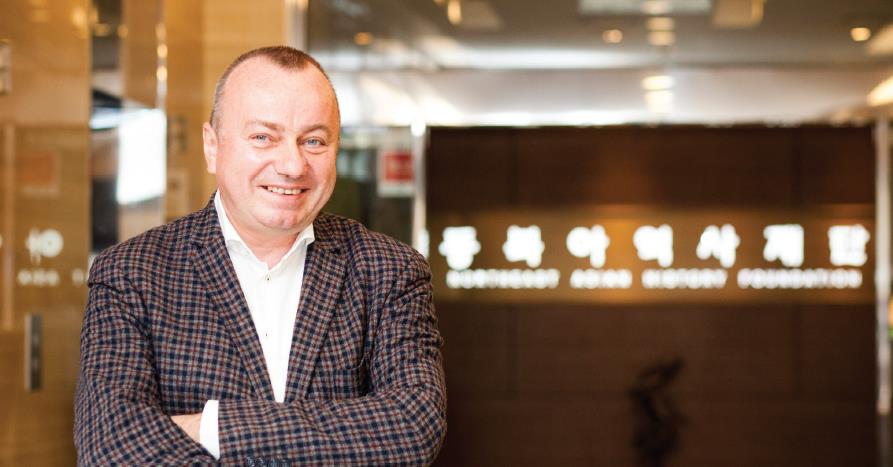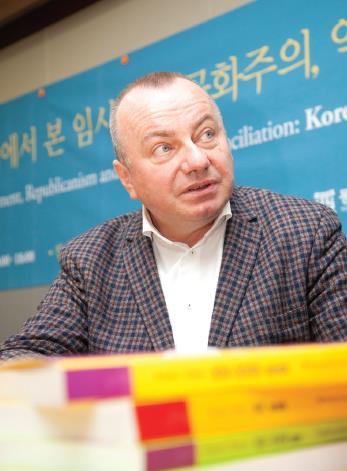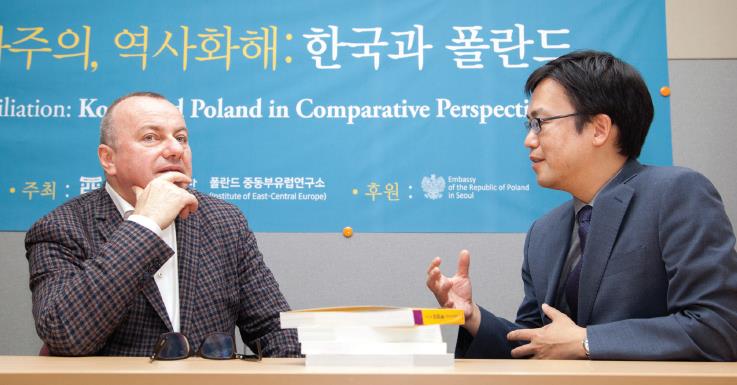NORTHEAST ASIAN HISTORY FOUNDATION 07/2018
-
Kim Jong-hak (NAHF Institute of Japanese Studies)

Miroslaw Filipowicz
Director, Institute of East-Central Europe
Miroslaw Filipowicz is a prominent Polish historian who served as a professor at the University of Lublin and as head of the university's historical research institute. In 2013, he became head of the Institute of East-Central Europe which focuses on the history and current affairs of central and eastern Europe, while conducting studies on Poland-Russia relations as well. In 2016, he was appointed as Plenipotentiary of the Minister of Foreign Affairs for the Polish-Russian Group for Difficult Matters and has been serving as chair for the Polish side of the group. His major publications include "Między Wschodem i Zachodem" [Between East and West] and "Emigranci i jankesi. O amerykańskich historykach Rosji" [Emigrants and Yankees: On American Historians of Russia] among others.
Despite decades of antagonism stemmed from historical disputes dating back to before the nineteenth century, World War Two, and territorial issues, Poland and Russia have managed to look beyond their different regimes and ideologies to achieve historical reconciliation. For Northeast Asia to overcome its past dictated by war and violence and achieve peace, Korea, China, and Japan need to each go through the process of understanding one another's history.
In order to gain insight on efforts necessary to facilitate historical reconciliation in Northeast Asia, this month's interview with Polish historian Miroslaw Filipowicz looks at how Poland was able to overcome a history of conflict and what sort of collaborations Poland has been involved in with Russia for historical reconciliation, especially in terms of joint research and textbook authoring.
Founded by Professor Jerzy Kłoczowski, one of the most eminent Polish historians after World War II, the Institute of East-Central Europe (IESW) has been active as a research unit since 2001 (initially its status was that of the society). We are now a research institute supervised by the Minister of Foreign Affairs. We concentrate on the history and current state of affairs of East-Central Europe, yet, simultaneously, we have been conducting research on Russia and the history of Polish-Russian relations. We specialized particularly in the international dialogue projects. I have been the Head of the Institute since 2013 and since that moment, I have been trying to keep the Institute away from any political disputes and divisions; after all, we work for Poland and not for any Polish political party. In 2016, I was appointed the Plenipotentiary of the Minister of Foreign Affairs for the Polish-Russian Group for Difficult Matters [Polsko-Rosyjska Grupa do Spraw Trudnych]; I chair the Group on the Polish side. My professional engagement in history of historiography and methodology of history allows me to explain how conflict-generating history can be for societies and nations as well as indicate how profitable its role can be in our mutual understanding.
2. What do you think of the significance of the forthcoming NAHF-IESW Joint Symposium
The forthcoming symposium will be our third opportunity to meet. The two previous events turned out to be significant for both Korean and Polish participants, thus resulting in many reflections. Obviously, seeking for too far-reaching correspondences between the history of Poland and Korea might be quite illusionary; however, any attempts at finding a common language with a difficult neighbor is undoubtedly a feature that we share. Korea is a fascinating country; not only have we been able to find a common language with our Korean colleagues, but also, we have made friends. That seems to be quite important as we still have a lot of things to do together. This time we are going to focus on the interwar period, yet a most demanding task is still before us, that is, the years of World War II, which have left unhealed wounds in both Korea and East-Central Europe as well.
3. Most Koreans are not acquainted with the history of Poland. Could you explain briefly the historical background and the activities of the Polish Government-in-Exile and the international recognition of it?
The Polish government in exile was formed already in September 1939, that is, just after Poland being attacked by Germany and the USSR. The government was playing a key role in the Polish matters during World War II and, thanks to its determination, the Polish country managed to maintain legal continuity both abroad and domestically as the Polish Underground State. The State had at its disposal the army, that is, the Home Army in the country and Polish Armed Forces in the West; moreover, the Underground State had the authorities in exile as well as underground national authorities. After 1945, the international prominence of the government-in-exile significantly deteriorated; however, that was not what happened to the Polish emigration. Led by Jerzy Giedroyc, the Parisian circle of Culture [Kultura] was exerting a significant influence on the Polish intellectual elites both abroad and in the country throughout the post-war decades. After the overthrow of communism, it turned out that that circle of Polish emigrants influenced to great extent the foundations of the Polish foreign policy, especially that of the Eastern European region.
 4. After the United States of America, Poland is the second nation in the world that adopted the constitution. Please explain us its historical background and meaning.
4. After the United States of America, Poland is the second nation in the world that adopted the constitution. Please explain us its historical background and meaning.
The Constitution of 3 May, 1791, is definitely one of the Polish reasons to be proud of. The Constitution was adopted in the country that was to be erased from the maps of Europe for over 100 years. That document did eliminate a number of flaws in the then political system of the Polish-Lithuanian Commonwealth; however, there was not enough time to put those reforms into practice. Nevertheless, even after the fall of the country, the ideals of the Constitution of 3 May did not vanish, quite the contrary. Nowadays it is thought that the Constitution embodied the intellectual effort of truly engaged and determined Enlightenment thinkers put to cure the ailing country. The past Republic of Poland was an unusual monarchy due to her republican status. Even the very word Rzeczpospolita is a derivative of the word “republic.”
5. This year 2018 is the centennial of the national independence of Poland. Presumably this historical moment might be celebrated on a national scale. What is the main focus of the commemoration?
The contemporary Poland is significantly divided both in terms of politics and ideology. I even have an impression sometimes that the country is inhabited by two societies hostile towards each other. The centenary of regaining independence is, therefore, an important event as it may provide the opportunity for shared celebration, thus weakening the existing divisions, at least to some extent. The idea and tradition of Independence should unite us. Interestingly, the architects of Polish independence – Józef Piłsudski, Roman Dmowski or Wincenty Witos also did not hold the same political and ideological views. Nevertheless, in Warsaw there are monuments to all of them and all those three figures are highly respected. What is more, their endeavors to co-operate while erecting an independent country are the perfect example of patriotism.
6. I heard that the IESW has gained distinguished achievements over the historical reconciliation between Poland and Russia. What was the essence of the historical disputes between two nations? Also please tell us the main obstacle during your joint historical researches and how you went beyond it.
Yes, indeed. We did manage to achieve something that could have been considered unachievable. The Polish and Russian historians and history teachers prepared together a multi-volume collection of educational assistance materials. Our main objective was to encourage mutual empathy; that empathy, however, does not implicate adopting the other party’s point of view but consists in trying to understand the latter. We did manage to attain that goal. One of the major obstacles, which we also managed to overcome to a significant degree, concerned the non-substantive attempts at interfering by the Russian supervisors of the project in the content already agreed upon by the authors. It is worth mentioning that there were no instances of that kind on the Polish side. By granting the funds for that project, the Polish state guaranteed our intellectual autonomy. Interestingly, we were supported by a considerable number of Russian authors during the course of arguments with the Russian supervisors. This fact proves that historians are able to find common ground.

7. Please tell us your opinion on the historical disputes in the Northeast Asia, from the point of view of a historical theorist.
My professional integrity demands that I should express my personal opinions on this matter with considerable restraint. I am not that familiar with the history of Northeast Asia to assume the role of an expert here. What I can state, however, is that I am very happy that Korea is seriously pondering upon the necessity of initiating a dialogue with Japan about the painful history, and that I do hope that the Japanese answer would be full of understanding and kindness. The region in question seems to be divided by its history even more than our part of Europe. I guess it would very beneficial if would not forget that honest historians could and should be partners for discussion, even if the outcome of such a dialogue reveals divergent opinions. No matter the results, you will still be able to understand each other better.
8. What do you think of the prospects on the academic exchange between Poland and Korea? And if there is anything you hope from NAHF in this regard, please tell us.
I am really impressed by the determination and intellectual potential of NAHF. And I can only envy you your budgetary. Korea does invest in the intellectual development. However, I have an impression, probably due to my Europocentric perspective, that you could do even more to make your voice present in the international historical debates. Seldom do I see publications by Korean historians in the leading historical journals. The Japanese presence is definitely more pronounced. However, this is not a matter of any kind of rivalry but of leaving one’s own patriotic ghetto. When it comes to the academic collaboration between Poland and Korea, I believe that both countries may enrich each other and our collaboration with NAHF only confirms such a possibility. What is more, I would really like to see Korean experts become the international observers of our work with Russians. That may also turn out to be a very beneficial experience for you.


